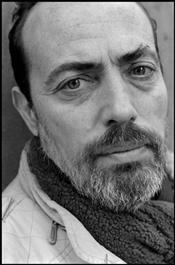
Bruce Gilden's childhood in Brooklyn endowed him with a keen eye for observing urban behaviors and customs. He studied sociology, but his interest in photography grew when he saw Michelangelo Antonioni's film Blow-Up, after which he began taking night classes in photography at the New York School of Visual Arts.
Gilden's curiosity about strong characters and individual peculiarities has been present from the beginning of his career. His first major project, which he worked on until 1986, focused on Coney Island, and on the intimacy of the sensual, fat or skinny bodies sprawled across the legendary New York beach. During these early years Gilden also photographed in New Orleans during its famous Mardi Gras festival. Then, in 1984, he began to work in Haiti, following his fascination with voodoo places, rites and beliefs there; his book Haiti was published in 1996.
In June 1998 Gilden joined Magnum. He returned to his roots and tackled a new approach to urban spaces, specifically the streets of New York City, where he had been working since 1981. His work culminated in the publication of Facing New York (1992), and later A Beautiful Catastrophe (2005); getting ever closer to his subject, he established an expressive and theatrical style that presented the world as a vast comedy of manners.
His project After the Off, with text by the Irish writer Dermot Healey, explored rural Ireland and its craze for horseracing. Gilden's next book, Go, was a penetrating look at Japan's dark side. Images of the homeless and of Japan's mafia gangs easily bypassed the conventional visual clichés of Japanese culture.
Gilden, who has travelled and exhibited widely around the world, has received numerous awards, including the European Award for Photography, three National Endowment for the Arts fellowships, and a Japan Foundation fellowship. He lives in New York City.
